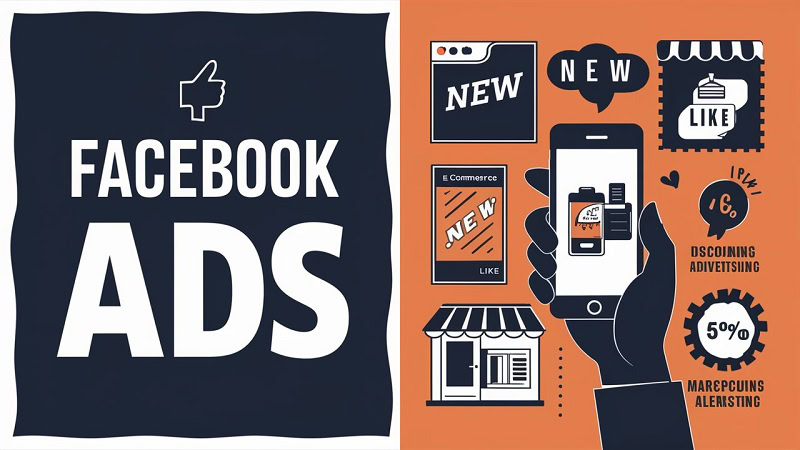
About author: Jack Evans brings his extensive experience in digital marketing to the table, specialising in paid social strategies that drive growth for e-commerce and DTC brands.
Ever felt like you’re throwing darts in the dark when it comes to Facebook ad bidding? You’re not the only one scratching your head over this.
With so many options and constantly changing algorithms, finding the right bid strategy can feel like trying to solve a Rubik’s cube blindfolded.
But don’t worry, we’ve got your back. Let’s cut through the noise and get to the heart of what really works.

Boost E-Commerce ROI: Download Our Free CPA & ROAS Calculator
Ready to turn those Facebook ad campaigns from money pits into profit machines? Stick around as we break down the best bid strategies that reputable Facebook ad agencies use to help their clients win auctions and smile all the way to the bank.
Ready to elevate your business? Check out our Facebook advertising services and see how we can help you achieve incredible results!

Understanding Facebook’s Ad Auction System
Before we jump into bid strategies, let’s quickly go over how Facebook’s ad auction system works. It’s not just about who’s willing to shell out the most cash. Facebook uses a complex algorithm that considers three main factors:
1. Advertiser bid
2. Estimated action rates
3. Ad quality and relevance
Your bid tells Facebook how much you’re willing to pay for an ad placement. But here’s the kicker: even if you bid high, you might not win the auction if your ad isn’t relevant or doesn’t engage users.
Estimated action rates predict how likely someone is to take the action you’re optimising for, like clicking a link or making a purchase. Facebook’s algorithm crunches the numbers based on the user’s past behaviour and your ad’s performance history.
Ad quality and relevance measure how interesting or useful your ad is to a particular person. Facebook looks at factors like engagement rates and feedback to figure this out.
So, what does all this mean for your bidding strategy? Well, it’s not just about throwing money at the problem. You’ve got to create ads that people actually want to see and interact with. That way, you can win auctions even if you’re not the highest bidder.
Types of Bid Strategies on Facebook
Facebook offers several bid strategies, each designed for different campaign goals. Let’s break them down:
Lowest Cost (Automatic Bidding)
This is Facebook’s default option, and it’s pretty straightforward. You set your budget, and Facebook tries to get you the most results at the lowest possible cost. It’s great if you’re just starting out or don’t want to mess around with manual bidding.
But here’s the thing: while it’s easy to use, you might not always get the best value for your money. Facebook will spend your entire budget, even if the results aren’t stellar. So keep an eye on your campaigns and be ready to adjust if needed.
Cost Cap
Want more control over your spending? Cost Cap might be your go-to strategy. You tell Facebook the maximum amount you’re willing to pay for each result, and it tries to keep your average cost at or below that number.
This strategy is handy when you know exactly how much a lead or conversion is worth to you. It helps you stay profitable while still giving Facebook some flexibility to optimise your campaigns.
Bid Cap
Bid Cap is for the control freaks out there (and we mean that in the best way possible). You set the absolute maximum you’ll pay for each ad placement. Facebook won’t go a penny over this amount, even if it means missing out on some auctions.
This strategy can be tricky to get right. Set your cap too low, and your ads might not show up much. Set it too high, and you could overpay. But when you nail it, Bid Cap can be a powerful tool for keeping costs in check.
Target Cost (for App Install Campaigns)
If you’re promoting an app, Target Cost is worth a look. You set a target cost per install, and Facebook tries to keep your average cost close to that target over time. It’s similar to Cost Cap but with a bit more wiggle room.
This strategy can help you scale your app install campaigns while maintaining a relatively stable cost per install. Just remember, your actual costs might fluctuate above and below the target in the short term.
Choosing the Right Bid Strategy
Now that we’ve covered the options, how do you pick the right one for your campaigns? Here are some factors to consider:
Campaign Objectives
What are you trying to achieve? If you’re after brand awareness or reach, Lowest Cost might be your best bet.
For conversions or app installs, Cost Cap or Target Cost could work well. And if you need tight control over your spending, Bid Cap might be the way to go.
Budget and Risk Tolerance
How much can you afford to spend, and how much risk are you comfortable with? Lowest Cost is less risky but might not be as efficient. Manual bidding strategies like Cost Cap and Bid Cap give you more control but require more attention and tweaking.
Competition and Market Conditions
Are you in a highly competitive niche? You might need to be more aggressive with your bidding. In less competitive markets, you might get away with lower bids.
Historical Data
If you’ve run Facebook ads before, use that data to inform your bidding decisions. Look at your past cost per result and use that as a starting point for setting caps or targets.
Testing and Optimisation
Here’s a secret: there’s no one-size-fits-all best bid strategy. What works for one business might flop for another. That’s why testing is crucial.
Start by running split tests with different bid strategies. Use the same ad creative and targeting, but vary your bidding approach. Let the campaigns run for at least a week (or until you’ve got enough data to draw conclusions) before making any decisions.
Once you’ve found a strategy that works, don’t just set it and forget it. Keep an eye on your results and be ready to adjust. Facebook’s algorithm and your competition are always changing, so what works today might not work tomorrow.
Advanced Bidding Tips and Tricks
Want to take your Facebook ad bidding to the next level? Try these advanced techniques:
Dayparting
Some businesses find that their ads perform better at certain times of day. Use dayparting to adjust your bids based on performance data. You might bid higher during peak conversion times and lower when engagement drops off.
Geotargeting
If you notice that certain locations convert better than others, consider adjusting your bids accordingly. You might set higher bids for high-performing areas and lower bids (or exclude entirely) for underperforming regions.
Audience Segmentation
Not all audiences are created equal. Segment your audiences based on factors like engagement level, past purchases, or demographics. Then, tailor your bid strategies to each segment. You might bid more aggressively for your most valuable customers, for example.
Seasonal Adjustments
Many businesses see fluctuations in performance throughout the year. Plan ahead for seasonal changes and adjust your bidding strategy accordingly. You might need to bid higher during peak seasons to stay competitive.
Common Bidding Mistakes to Avoid
Even experienced advertisers can fall into these traps. Watch out for:
Setting and Forgetting: Your bid strategy isn’t a crock pot. You can’t just set it and forget it. Keep tabs on your campaigns and be ready to make adjustments as needed.
Focusing Solely on Cost: Yes, keeping costs down is important. But don’t get so caught up in lowering your CPC or CPA that you sacrifice volume or quality. Sometimes, paying a bit more per result can lead to better overall outcomes.
Ignoring Ad Quality: Remember, your bid is just one part of the equation. If your ads aren’t engaging or relevant, even high bids won’t save you. Always focus on creating high-quality, targeted ads.
Overreacting to Short-Term Fluctuations: It’s easy to panic when you see costs spike or performance dip. But don’t make knee-jerk reactions based on short-term data. Look for trends over time before making major changes to your bidding strategy.
The Future of Facebook Ad Bidding
As with everything in the digital world, Facebook’s ad platform is always evolving. While we can’t predict exactly what changes are coming, we can make some educated guesses:
Increased Automation
Facebook is investing heavily in machine learning and AI. Expect to see more advanced automated bidding options that can optimise for complex goals and adapt in real-time to changing conditions.
More Granular Control
At the same time, advertisers are clamouring for more control over their campaigns. Facebook might introduce more nuanced bidding options that allow for greater customisation.
Integration with Other Platforms
As the lines between different ad platforms blur, we might see more integrated bidding strategies that work across Facebook, Instagram, and other platforms.
Focus on Value-Based Bidding
Facebook has already introduced value-based lookalike audiences. In the future, we might see more bidding options that take into account the lifetime value of customers, not just immediate conversions.
Wrapping Up
Choosing the best bid strategy for your Facebook ads isn’t a one-time decision. It’s an ongoing process of testing, learning, and adapting. Start with the basics, experiment with different approaches, and always keep your end goals in mind.
Remember, there’s no magic bullet that works for everyone. The “best” bid strategy is the one that helps you achieve your specific business objectives within your budget constraints. So don’t be afraid to try new things and trust the data.
Now it’s your turn. Armed with this knowledge, go forth and conquer those Facebook ad auctions. Your perfect bid strategy is out there waiting for you to discover it. Happy bidding!







